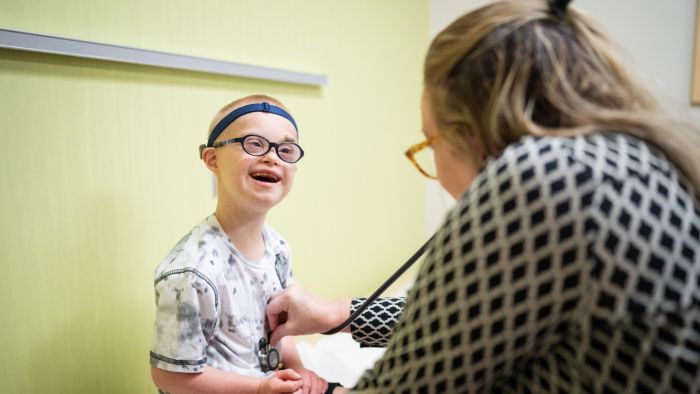A partnership with the Down Syndrome Association of Minnesota (DSAMn) as well as strong collaboration with other programs at Gillette Children’s makes the Gillette Down Syndrome Clinic stand out when it comes to helping children and families navigate the health challenges that often come with this condition.
Down syndrome is a genetic condition that occurs when a child is born with an extra copy of chromosome 21, and is the most common chromosomal condition in the United States. It occurs
in about 1 of every 700 babies.
Gillette is a regional leader in complex pediatric care and offers a family-centered approach and early intervention programs for children who have Down syndrome.
What makes Down syndrome care at Gillette Children's different?
“We hope our clinic helps create a space for our Down syndrome families to feel heard and find community,” says Gillette complex care pediatrician, Uyen Truong, MD.
She adds Gillette’s partnership with the Down Syndrome Association of Minnesota brings many benefits and connections to families. “It’s a way for families to connect with each other and provide them with additional access to things that are not necessarily medical,” Dr. Truong says.
“There have been many iterations of Down syndrome clinics throughout the years in Minnesota, but they have collapsed as they were built upon a wonderful, single provider without a focus on sustainability,” says internal medicine and complex care pediatrician, Tori Bahr, MD. “The Gillette clinic is a collaboration among four providers bringing different perspectives and knowledge to the table.”
Dr. Bahr adds, “It is an absolute privilege to collaborate with my brilliant co-providers, Dr. Truong, Dr. Peter Ladner, our nurse practitioner, Heidi Davis, APRN, CPNP, and nurse care manager, Kristine Herman, RN, all of whom inspire me daily and make me a better doctor. Using the latest Down syndrome research and dreaming together about how we can make the clinic even more effective for patients is very exciting.”
Another difference at Gillette is the fact that comprehensive Down syndrome care spans a variety of care settings, such as urgent care in the Gillette Quick Care clinic, outpatient specialty care, inpatient hospitalizations, surgery, dentistry, audiology, imaging, and sedated services.
What should families expect during a visit to the Gillette Down Syndrome Clinic?
Internal medicine and complex care pediatrician Peter Ladner, MD, says families should expect in-depth conversations when they come to the Gillette Down Syndrome Clinic. “The clinic is structured to provide ample support, and families will meet with a dedicated nurse care manager,” Dr. Ladner says.
Some of the initial conversation topics during a clinic visit might include a child’s nutrition, development, common musculoskeletal issues, endocrine disorders (such as thyroid disease screening), hearing concerns, and sleep-related issues such as sleep apnea.
Dr. Truong adds “We will assess a child from head to toe.”
Why are primary care providers so important to the Gillette Down Syndrome team?
Gillette Down Syndrome Clinic team also prioritizes building strong relationships with primary care providers. Dr. Bahr says building a solid team for children is critical.
“We want to help primary care providers and be that team where they can bounce ideas off of us and feel they can reach out when they need assistance with coordinating care such as a sedated blood draw,” Dr. Bahr says.
The Gillette team encourages families and primary care providers to reach out early in a child’s life so relationships can be established and care plans created for each child’s unique situation.
The Gillette Down Syndrome Clinic team can also help families and primary care providers with the transition from pediatric to adult healthcare.
“Medicine is more fun when we do it as a team,” Dr. Bahr says. “We couldn’t do this clinic without our primary care partners.”
Join Our Partners in Care Community!
Subscribe to Partners in Care Journal, a newsletter for medical professionals.
Subscribe Today Home Page
Home Page

